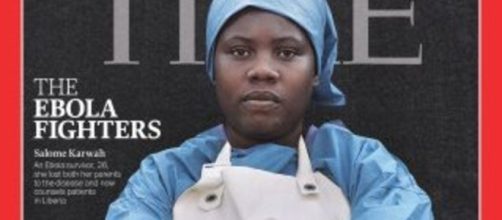The deadly disease ravaged west africa in 2014, claiming over 11,000 lives, but was declared no longer an emergency last year.
The Liberian nursing assistant Salome Karwah lost nearly her whole family, including both her parents. However, she, her sister, and fiancé survived.
As she recovered from the disease, she began working at the Médecins Sans Frontières Ebola treatment unit in Monrovia. As she had already contracted the disease, and was therefore not a contamination risk, she was one of the few people who could tend to the sick hands on. It is reported she would even rock babies overcome with fever to sleep.
Karwah dedicated herself to helping others.
Her dream was to open her own Ebola clinic where 'super-nurses' - those who had survived the disease - would treat patients. Because of her work and her vision, Times named her one of their Ebola Fighters of the Year 2014, and she appeared on the front cover of Time magazine.
After falling pregnant with her fourth child, she gave birth to a boy, Solomon, on February 17th by caesarean. She was discharged from hospital with no issues three days later. Shortly after returning home, Karwah collapsed into convulsions, however medical staff refused to touch her as her symptoms were like Ebola.
lingering suspicion over Ebola blamed
Karwah died shortly after arriving at hospital.
Whilst the cause of her death is still unknown, her sister insists it was complications from her caesarean surgery. She argues that if medical staff had treated her immediately, she would still be here to raise her four children.
Karwah's death has come as a shock for those who worked closely with her in 2014. Those who knew her for her unwavering efforts at the MSF Ebola treatment clinic were devastated. “To survive Ebola and then die in the larger yet silent epidemic of health system failure... I have no words,” says Ella Watson-Stryker, a health promoter who worked with Karwah in Liberia and was also among the Ebola Fighters on the 2014 cover.
The World Health Organisation declared Ebola as no longer an emergency on 29 March 2016. However, it is reported that survivors are still treated with suspicion and that this fear was partly to blame for Karwah's death. 17,000 who contracted the virus survived, and it is extremely rare for someone to contract it twice.

